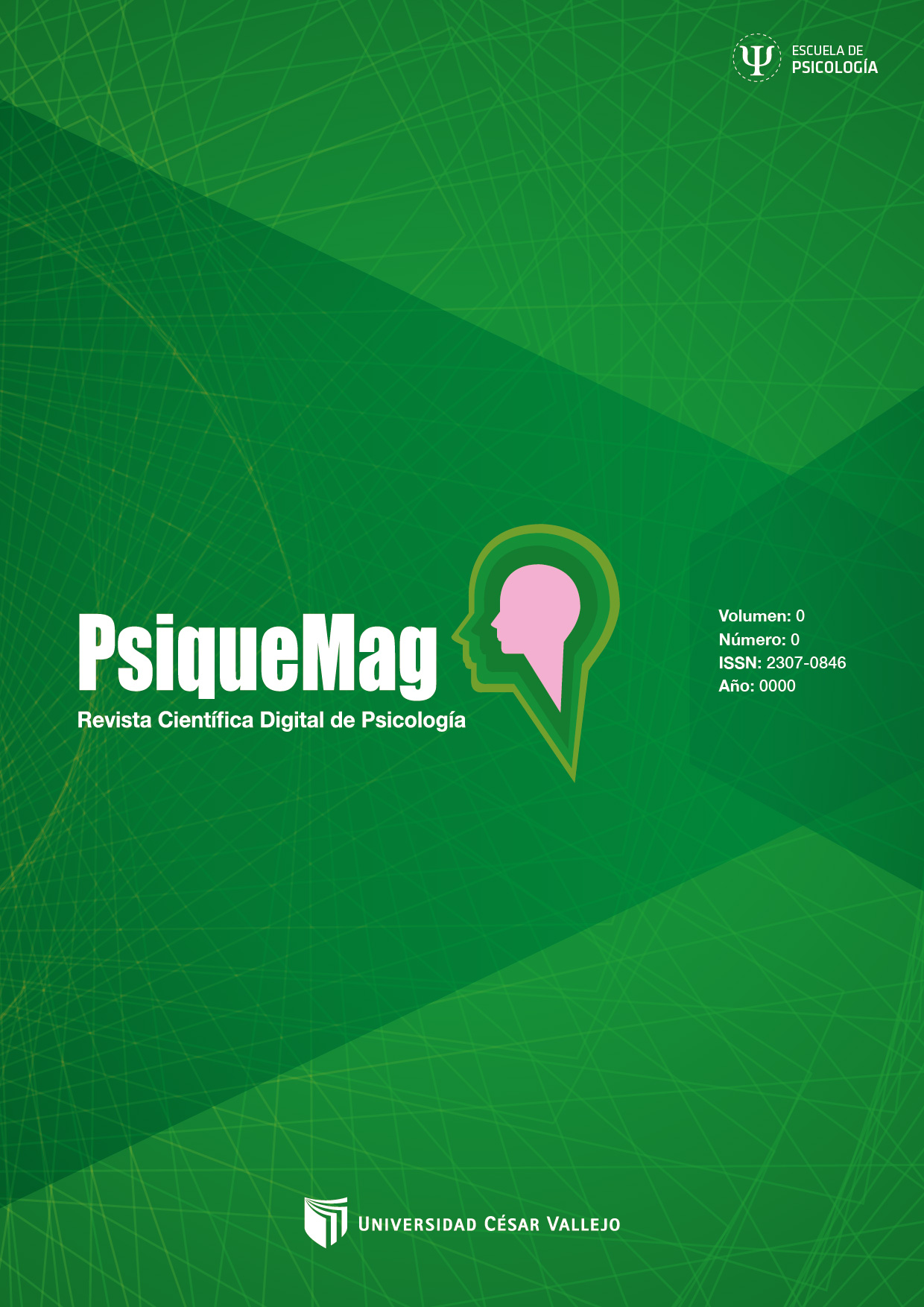Plan de intervención psicoterapéutica para reducir los efectos emocionales del Síndrome del nido vacío en adultos mayores.
DOI:
https://doi.org/10.18050/psiquemag.v13i1.2679Palabras clave:
sindrome nido vacio, emociones, Psicoterapia, adulto mayorResumen
El síndrome del nido vacío es un trastorno psicológico que conlleva implicaciones emocionales significativas para los progenitores cuando sus hijos dejan el hogar. Entre las experiencias comunes se encuentran la ansiedad, la depresión, la carencia de estrategias de afrontamiento y la disfuncionalidad familiar. Objetivo: El propósito es diseñar un plan de intervención psicoterapéutica destinado a mitigar los efectos emocionales del síndrome del nido vacío en adultos mayores. Material y métodos: Se llevó a cabo un estudio descriptivo-exploratorio con un enfoque cuantitativo, utilizando un diseño pretest. La muestra, constituida por 100 adultos mayores de 65 años, se seleccionó mediante muestreo por conveniencia. Se diseñó un cuestionario que incluía variables demográficas y se aplicaron pruebas como el Mini Mental, Yesavage, Apgar Familiar, Hamilton-Ansiedad y Afrontamiento CAE. Los datos se analizaron con el programa estadístico SPSS V 22.00 y Stata 17.0. Resultados: Se observaron diferencias significativas en indicadores emocionales y otras variables sociodemográficas, particularmente en depresión, disfunción familiar, falta de afrontamiento y ansiedad (p > 0,05). Asimismo, se encontró que la edad, el sexo, la residencia y el estado civil ejercen una influencia significativa (P > 0,05). Conclusión: El plan de intervención psicoterapéutica enfatiza la importancia de mejorar la salud, los estilos de vida y la dinámica familiar, así como fomentar la integración de las personas mayores en la sociedad.
Descargas
Referencias
Anastasia Stuart-Edwards, Adriane MacDonald, M. A. A. (2023). Twenty years of research on mindfulness at work: A structured literature review. Journal of Business Research, 169(4), 114–285. https://doi.org/doi.org/10.1016/j.jbusres.2023.114285.
Arias, P. R., Gordón-Rogel, J., Galárraga-Andrade, A., & García, F. E. (2022). Propiedades Psicométricas de la Hamilton Anxiety Rating Scale (HARS) en Estudiantes Ecuatorianos. Revista AJAYU, 20(2), 273–287. https://doi.org/10.35319/ajayu.202110
Bar-Tur, L. (2021). Fostering Well-Being in the Elderly: Translating Theories on Positive Aging to Practical Approaches. Frontiers in Medicine, 8(April), 1–9. https://doi.org/10.3389/fmed.2021.517226
Bougea, A., Despoti, A., & Vasilopoulos, E. (2019). Empty-nest-related psychosocial stress: Conceptual issues, future directions in economic crisis. Psychiatriki, 30(4), 329–338. https://doi.org/10.22365/jpsych.2019.304.329.
CEPAL. (2023). XII Reunión de la Conferencia Estadística de las Américas de la. 2023. https://cea.cepal.org/12/es
Cevallos, V. (2023). Informe del Estado Situacional del Servicio de Cuidado Gerontológico Integral para Personas Adultas Mayores provisionado por el MIES y Entidades Cooperantes. In Ministerio de Inclusión Económica y Social (Vol. 1, Issue 2). https://www.inclusion.gob.ec/direccion-poblacion-adulta-mayor/
Cohen, Y., Spector-Mersel, G., & Shiovitz-Ezra, S. (2023). The second empty nest: The lived experience of older women whose intensive ‘grandmotherhood’ has ended. Journal of Aging Studies, 66(July), 101163. https://doi.org/10.1016/j.jaging.2023.101163
Dos Santos, R. I. M., De Cárdenas, A. M. C., Chamilco, R. A. D. S. I., Da Mata, N. D. S., Prudêncio, L. D. S., & De Assis Mello, M. V. F. (2021). Empty nest syndrome: Experiences of elderly people at the university of maturity project in amapÁ. Ciencia y Enfermeria, 27(2), 24–45. https://doi.org/10.29393/cs27-14sdra60014
Drysdale, C. (2021). La discriminación por edad es un desafío global: ONU Ginebra, Suiza: Organización Mundial de la Salud; 2021.
Fairburn, C. G. (2008). Cognitive behavior therapy and eating disorders. Guildford Press.
Feijoo D, E. alt. (2016). Mini-Mental State Examination. Potenciar La Lectura Desde La Farmacia Comunitaria En Personas Mayores Para Protegerlos Del Deterioro Cognitivo.
Flórez, J. A., & González, M. J. (2000). Psicoterapia en el anciano. Medicina Integral, 36(2), 1–14.
Gao, M., Li, Y., Zhang, S., Gu, L., Zhang, J., Li, Z., Zhang, W., & Tian, D. (2017). Does an empty nest affect elders’ health? Empirical evidence from China. International Journal of Environmental Research and Public Health, 14(5). https://doi.org/10.3390/ijerph14050463
Gardner, W., Nutting, P. A., Kelleher, K. J., Werner, J. J., Farley, T., Stewart, L., Hartsell, M., & Orzano, A. J. (2001). Does the family APGAR effectively measure family functioning? Journal of Family Practice, 50(1), 19–25.
Glashouwer, K. A., Timmerman, J., & de Jong, P. J. (2020). A personalized approach-avoidance modification intervention to reduce negative body image. A placebo-controlled pilot study. Journal of Behavior Therapy and Experimental Psychiatry, 68, 101544. https://doi.org/10.1016/j.jbtep.2019.101544
Gong, F., Zhao, D., Zhao, Y., Lu, S., Qian, Z., & Sun, Y. (2018). The factors associated with geriatric depression in rural China: Stratified by household structure. Psychology, Health and Medicine, 23(5), 593–603. https://doi.org/10.1080/13548506.2017.1400671
Greenfield, E. A., & Marks, N. F. (2004). Formal volunteering as a protective factor for older adults’ psychological well-being. Journals of Gerontology - Series B Psychological Sciences and Social Sciences, 59(5), 258–264. https://doi.org/10.1093/geronb/59.5.S258
Guarino, A., Forte, G., Giovannoli, J., Casagrande, M. (2020). Executive functions in the elderly with mild cognitive impairment: a systematic review on motor and cognitive inhibition, conflict control and cognitive flexibility. Aging and Mental Health, 24(7), 1028–1045. https://doi.org/10.1080/13607863.2019.1584785
Hall, J., Kellett, S., Berrios, R., Bains, M. K., & Scott, S. (2016). Efficacy of Cognitive Behavioral Therapy for Generalized Anxiety Disorder in Older Adults: Systematic Review, Meta-Analysis, and Meta-Regression. American Journal of Geriatric Psychiatry, 24(11), 1063–1073. https://doi.org/10.1016/j.jagp.2016.06.006
Hamilton, M. (1982). Escala De Ansiedad De Hamilton. Servicio Andaluz de Salud, 79(39), 3456–3458. http://www.hvn.es/enfermeria/ficheros/escala_de_ansiedad_de_hamilton.pdf
Hayes, S. C. (2019). Acceptance and commitment therapy: towards a unified model of behavior change. World Psychiatry, 18(2), 226–227. https://doi.org/10.1002/wps.20626
Helsinki, & Finlandia. (1996). Declaración de Helsinki de la Asociación Médica Mundial: principios éticos para las investigaciones médicas en seres humanos. Asamblea General Somerset West.
Huang, L.-J., Du, W.-T., Liu, Y.-C., Guo, L.-N., Zhang, J.-J., Qin, M.-M., Liu, K. (2019). Loneliness, Stress, and Depressive Symptoms Among the Chinese Rural Empty Nest Elderly: A Moderated Mediation Analysis. Issues in Mental Health Nursing, 40(1), 73–78. https://doi.org/10.1080/01612840.2018.1437856
Huang, G., Duan, Y., Guo, F., & Chen, G. (2020). Prevalence and related influencing factors of depression symptoms among empty-nest older adults in China. Archives of Gerontology and Geriatrics, 91, 104183. https://doi.org/10.1016/J.ARCHGER.2020.104183
Itishree Nayak, A. S. y B. K. P. (2022). Does Empty Nest Elderly Experience More Depressive Symptoms than Non-Empty Nest Elderly? Evidence from Longitudinal Aging Study in India. Itishree Nayak , Ankita Siddhanta y Basant Kumar Panda, 1(12), 23–29. https://doi.org/10.1080/00185868.2022.2097970
Lega, L., Sorribes, F., & Calvo, M. (2017). Terapia Racional Emotiva Conductual (TREC). Manual de Técnicas de Intervención Cognitivo Conductuales, 317–361.
Liang, Y., & Wu, W. (2014). Exploratory analysis of health-related quality of life among the empty-nest elderly in rural China: An empirical study in three economically developed cities in eastern China. Health and Quality of Life Outcomes, 12(1), 1–16. https://doi.org/10.1186/1477-7525-12-59
Ma Y, Fu H, Wang JJ, Fan LH, Zheng JZ, Chen RL, Qin X, H. Z. (2012). Study on the prevalence and risk factors of depressive symptoms among “empty-nest” and “non-empty-nest” elderly in four provinces and cities in China. Zhonghua Liu Xing Bing Xue Za Zhi, 33(5), 478–482.
Mahmoudpour, A., Ferdousi Kejani, K., Karami, M., Toosi, M., & Ahmadboukani, S. (2023). Cognitive flexibility and emotional self-regulation of the elderly with Empty nest syndrome: Benefits of acceptance and commitment therapy. Health Science Reports, 6(7), 1–9. https://doi.org/10.1002/hsr2.1397
McQuaide. (1998). Women at midlife. Soc Work., 43(1), 21–31. https://doi.org/10.1093/sw/43.1.21
Montes de Oca, V., & Hebrero, M. (2006). Eventos cruciales y ciclos familiares avanzados: el efecto del envejecimiento en los hogares de México. Papeles de Población, 12(50), 97–116.
Pizadeh, N., Yarelahi, M.m Nazari, M. y Asadollahi, A. (2023). The empty nest syndrome assessment instrument: development and psychometric properties of Persian version among iranian older adults. Educational Gerontology, 1(2), 16. https://doi.org/10.1080/03601277.2023.2209457
Sandín B, C. P. (2002). Cuestionario de Afrontamiento del Estrés. Planetary and Space Science, 27(4), 351–354. https://doi.org/10.1016/0032-0633(79)90112-0
Sarkar, M., Kasemi, N., Majumder, M., Sk, M. A., Sarkar, P., Chowdhury, S., Roy, D., & Halder, M. (2023). Physical and mental health among older parents: Does offspring migration and living arrangement matter? Findings from Longitudinal Aging Survey in India (2017-18). SSM - Population Health, 24(July), 101503. https://doi.org/10.1016/j.ssmph.2023.101503
Senín-Calderón, C., Santos-Morocho, J., & Rodríguez-Testal, J. F. (2020). Validation of a Spanish version of the physical appearance comparison scales. International Journal of Environmental Research and Public Health, 17(20), 1–15. https://doi.org/10.3390/ijerph17207399
Sheik JI, Y. J. G. (1986). Geriatric Depression Scale. Clin Gerontol., 2(1), 1–2.
Tabachnick, B. G., & Fidell, L. S. (2007). Using Multivariate Statistics. Pearson Education, Inc. https://doi.org/10.1037/022267
Wang, G., Hu, M., Xiao, S. Y., & Zhou, L. (2017). Loneliness and depression among rural empty-nest elderly adults in Liuyang, China: A cross-sectional study. BMJ Open, 7(10), 1–9. https://doi.org/10.1136/bmjopen-2017-016091
Wang H, Chen K, Zhou B, W. J. (2010). Study on social determinants and health-related quality of life among the “empty nest” (lonely) elderly Chinese people. Zhonghua Liu Xing Bing Xue Za Zhi., 4(10), 400–404.
Wang L, Liu W, Liang Y, W. Y. (2019). Mental Health and Depressive Feeling of Empty-nest Elderly People in China. American Journal of Health Behavior., 43(6), 1171–85. https://doi.org/10.5993/AJHB.43.6.14
Xu, S., Yang, X., Liu, J., Chong, M. K. C., Cheng, Y., Gong, W., & Zou, G. (2023). Health and wellbeing among the empty nest and non-empty nest elderly in China-Results from a national cross-sectional study. PloS One, 18(9), e0291231. https://doi.org/10.1371/journal.pone.0291231
Zhao, D., Li, J., Fu, P., Hao, W., Yuan, Y., Yu, C., Jing, Z., Wang, Y., & Zhou, C. (2021). Cognitive frailty and suicidal ideation among Chinese rural empty-nest older adults: Parent-child geographic proximity as a possible moderator. Journal of Affective Disorders, 282(December 2020), 348–353. https://doi.org/10.1016/j.jad.2020.12.111
Descargas
Publicado
Número
Sección
Licencia
Derechos de autor 2024 Jose Santos Morocho, Paola Guadalupe-Tixi

Esta obra está bajo una licencia internacional Creative Commons Atribución 4.0.
Usted es libre de:
- Compartir — copiar y redistribuir el material en cualquier medio o formato
- El licenciador no puede revocar estas libertades mientras cumpla con los términos de la licencia.
Bajo las condiciones siguientes:
-
Reconocimiento — Debe reconocer adecuadamente la autoría, proporcionar un enlace a la licencia e indicar si se han realizado cambios<. Puede hacerlo de cualquier manera razonable, pero no de una manera que sugiera que tiene el apoyo del licenciador o lo recibe por el uso que hace.













